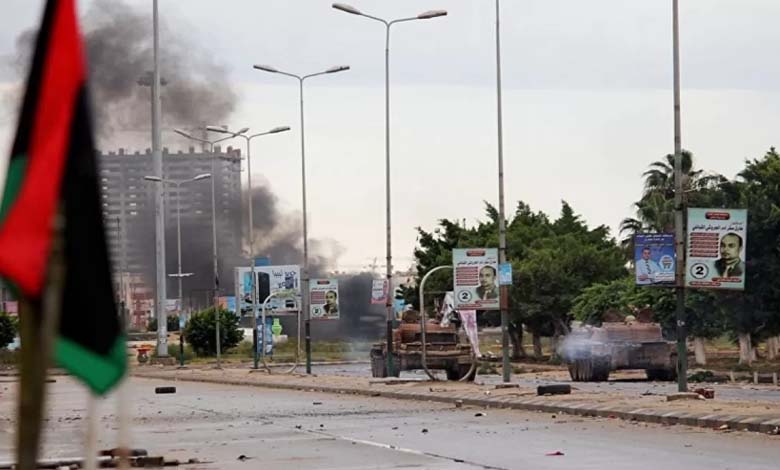Heavy Clashes in Tripoli After the Killing of a Militia Leader Affiliated with the Presidential Council

The death of Abdelghani al-Kikli, also known as Ghnewa, head of the Stability Support Apparatus, has sparked bloody clashes in Tripoli, leading to the forces of the Government of National Unity taking control of all his headquarters—reshaping the balance of militia power in the Libyan capital.
On Monday evening, the Libyan capital Tripoli witnessed armed clashes, with gunfire echoing through the city center and other neighborhoods following the killing of a militia leader. Some sources indicated that fighting had subsided and relative calm was returning, but the incident has reignited the militia issue—one of the main obstacles to stability in Libya.
-
Political Stalemate Brings Militias in Western Libya Back into the Spotlight
-
Is Libya Becoming a Hub for Exporting Armed Militias to Africa?
The slain commander, Abdelghani al-Kikli, known as Ghnewa, led the Stability Support Apparatus, one of the most powerful armed groups in Tripoli, headquartered in the densely populated Abu Salim district. His assassination and the collapse of his forces are expected to reshape the city’s power map.
Reports say al-Kikli was attempting to contain a growing dispute between his faction and the 444 Brigade, which is affiliated with the Government of National Unity, over control of strategic sites in the capital, when he was killed.
The Stability Support Apparatus falls under the Presidential Council, which came to power in 2021 alongside the Dbeibah-led Government of National Unity through a UN-supported process.
-
The suffering of Libyan society from the presence and control of militias over decision-making in western Libya – Details
-
Libya: Tripoli Faces the Risk of New Confrontations between Militias
The exact cause of the clashes remains unclear, especially since the Dbeibah government supported recent controversial decisions by the Presidential Council that were rejected by the Parliament. The clashes highlight the disruptive role of armed groups in efforts toward peace.
On Sunday, Tripoli hosted a high-level security meeting with armed faction leaders to prevent further escalation.
According to Anbaa Express, the clashes were not spontaneous but the result of long-standing tensions between the Stability Support Apparatus and pro-government units like the 444 and 111 Brigades. Tensions escalated after Ghnewa tried to seize a key administrative facility, disrupting the fragile balance among armed factions.
-
Libyan candidates talk and militias mobilize as electoral process collapse
-
Weapon Chaos in Libya: Zawiya under the Grip of the Al-Farr and Al-Qasab Conflict
By early Tuesday, some security sources confirmed the fighting had stopped except for sporadic gunfire. On Monday night, government forces took over all premises of the Stability Support Apparatus.
However, Al-Wasat reported intense fighting continued in Bab Ben Ghashir near Camp 77, Ghnewa’s stronghold.
Government forces, led by Brigades 444 and 111, entered and secured all facilities affiliated with the Stability Support Apparatus in Tripoli and nearby areas, following Ghnewa’s mysterious death.
-
Western Libya Ablaze: Bloody Clashes Turn Streets into Warzones
-
Corruption and Terrorism Financing Drive Washington to Suspend Aid to Libya
Videos showed armed vehicles damaged, casualties, and detainees freed from the group’s barracks. No official figures have been released on the human or material losses, nor any statements on the fate of the apparatus or its members.
The Interior Ministry urged citizens to stay home for their safety. Panic swept the streets, with cars speeding and honking.
On Tuesday morning, the Defense Ministry confirmed it had fully regained control of Abu Salim.
PM Dbeibah praised the operation on X, saying: “I salute the Ministries of Interior and Defense and all members of the army and police for their achievement in restoring security and asserting state authority in the capital.”
-
Transfer of Armed Elements from Syria to Libya… A New Muslim Brotherhood Plan
-
A Scheme That Made Them Outcasts: The Waning Influence of the Muslim Brotherhood in Libyan Municipal Elections
A resident, speaking anonymously, said: “I heard intense gunfire and saw red flares in the sky.” Other witnesses reported clashes across Abu Salim and Salah al-Din areas.
The University of Tripoli suspended classes, exams, and administrative work until further notice.
The UN mission in Libya called for an “immediate ceasefire and return to calm,” warning that attacks on civilians could amount to war crimes.
-
Militia Power: The Kidnapping of an Intelligence Officer Denies Europe Access to Libyan Gas
-
Tension rises in Western Libya after assassination of one of the biggest human traffickers
The U.S. Embassy in Libya echoed the UN’s concerns, calling for civilian protection and urging immediate de-escalation.
Libya has seen little stability since the 2011 NATO-backed uprising. The country has been divided since 2014 between rival governments in the east and west. While major fighting ceased in 2020, political efforts remain stalled, and militia clashes continue over control of Libya’s vast resources.












